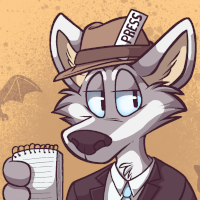How to love the freedom of leaderless fandom, and fight the flipside of organized abuse
by Patch O'Furr

Do you know the story where several blind people try to describe an elephant by only touching small parts of it? Nobody can say what the whole animal is.
That happens when furry subculture talks about itself, because of how it’s built. The whole thing is a series of bubbles that don’t see each other, in peer-to-peer horizontal structure. Their limited views go with a longstanding habit of reacting against outside stereotypes by falling into their own: The Geek Social Fallacies.
Fallacies can be actively overcome. Ignorance is bliss, but knowledge is power. If you don’t like the media, Be The Media. That’s the mission at Dogpatch Press, to tell the full story warts and all, and own it from inside — before outsiders tell it for you — but there’s always resistance. The subculture keeps stubborn blind spots. Many stories are too inside for professionals to investigate, but hobbyists lack the resources, especially when they explore problems that demand action that people don’t want to take. Difficult, costly, critical stories are the ones that stay overlooked, underreported, and suppressed. Nobody is immune to the psychology of denying uncomfortable knowledge. This is how you get too much shallow drama between peer-to-peer individuals, but too little intensive research with wider scope.
You may say the solution is showing more of the positive; but that’s not seeing the whole elephant.
It’s important to do the difficult work of telling the full range of human experience within, and maturely accept a place in society, not apart from it. The more we know, the more it empowers people to do better. This is a challenge always lagging behind the way this community grows.


